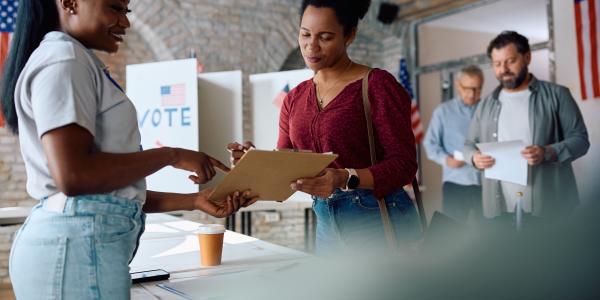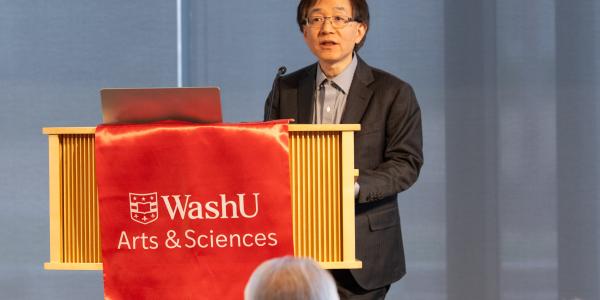For the second presidential election in a row, professors Andrew Reeves and Steven Malter have teamed up to help students study these races in real time. Their course bridges political science and business, showing students how the two fields intersect.
When he started his PhD in political science in the early 2000s, Andrew Reeves wasn’t sure he would have likened a political campaign to a start-up business. But, since then, the field has changed. Now, he said, it seems like a natural comparison.
“Campaigns have adapted to using social science and behavioral science, from A/B testing to brand development,” he said. “They now employ social scientists to understand what works and what doesn’t.”
Today, entrepreneurship is the lens that Reeves, a professor of political science, and Steven Malter, a professor of practice in management and entrepreneurship, employ in their Beyond Boundaries course “The Business of Elections.” This semester, they are teaching 75 first-year students to approach the topic from the disciplines of political science and business.
The idea for the class began 16 years ago when Malter taught an upper-level course on the business of presidential elections using the 2008 contest between McCain and Obama as a real-time example. When he later met Reeves, who taught a popular Arts & Sciences course on elections, they decided to join forces and leverage the 2020 Biden-Trump race as their first live case study.

So, how is a presidential campaign like a start-up? The professors explained that both begin with a round of fundraising, a marketing strategy, and a charismatic leader with a recognizable brand. Common tools include big data and social media, as well as microtargeting, data mining, A/B testing, brand development, and customer/voter engagement and acquisition.
There are also some notable differences. In a presidential campaign, the objective is to start from scratch, expand nationwide, and then dissolve, transitioning the team’s efforts into a different arena — a presidential administration — all within two years.
"Using a live case study is a little bit of a choose-your-own-adventure based on the current events."
To see exactly how this works, Reeves and Malter base their course around real-world examples and a variety of guest speakers. In a recent class session, Karen Hertz Unger, campaign manager for former Florida Gov. Jeb Bush, discussed how she built candidates’ public identities and fought sticky negative branding (remember “Sleepy Jeb”?). Other guests this semester include Dan Senor, political commentator and former senior foreign policy adviser to U.S. presidential candidate Mitt Romney; Rachel Schlinder, WashU alumna and co-founder of Punchbowl News; and Joe Lenski, co-founder and executive vice-president of Edison Research, the firm that provides the only U.S. election exit poll.
Building a course around a live case study has advantages as well as risks, Malter said. “It’s great when you can use a case from 2004 because you know how it turns out,” he explained on the Beyond Boundaries podcast. “But using a live case study is a little bit of a choose-your-own-adventure based on the current events. I think that’s what really excites Professor Reeves and myself about this course.”

Each week, students present news coverage of current events that could impact the Harris-Trump presidential race. The course encourages students to compare and contrast how different candidates’ policies and platforms could affect different constituencies and sectors of business, labor, and the economy. On the nights of the presidential and vice-presidential debates, the students and professors gather to watch and share reactions in real time.
First-year student Molly James said she’s enjoyed the interactive style of the course and the exposure to high-level guest speakers with insider political knowledge. For James, who is considering majoring in political science or following the path to pre-law, looking at political campaigns through the lens of business has been enlightening.
“We’ve discussed the idea that branding is overarching in both campaigns and companies and that in American society, for better or for worse, our votes are like dollars,” James said. “We spend our vote with this person or we spend our dollar at this company and, in a way, that’s how our voices get heard.”
While the class emphasizes the crossover between political science and business, the professors are also sensitive to the limits of the metaphor. “Though there are similarities in a campaign and a startup, there are also differences: Politics is about collective action, and business is primarily about profits,” Reeves explained. “Some of our most interesting conversations are drawing out where the parallels between business and politics end.”
Header image credit: Envato





